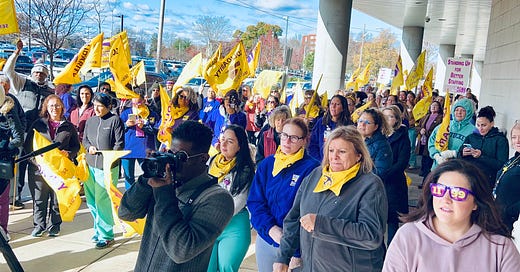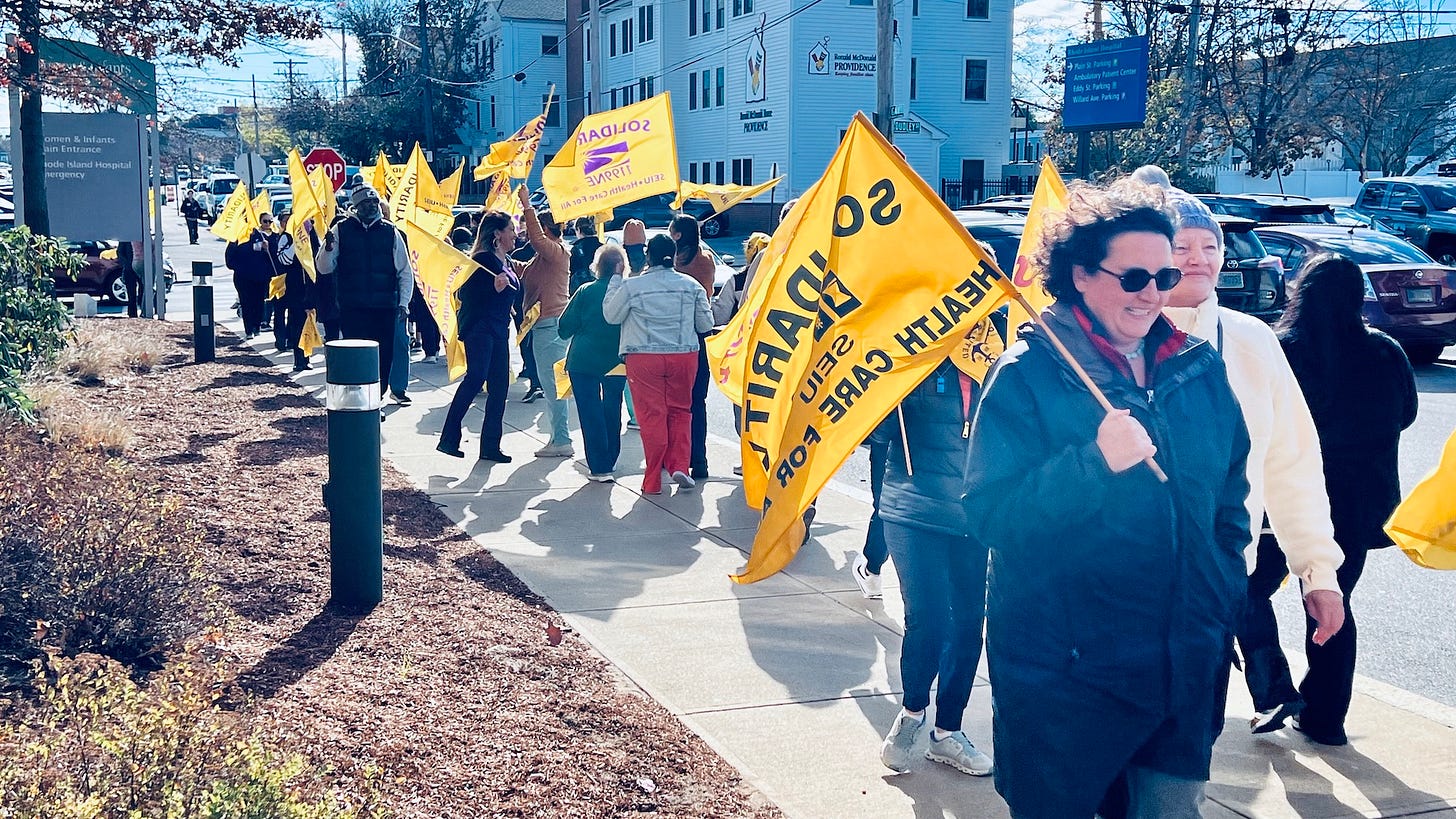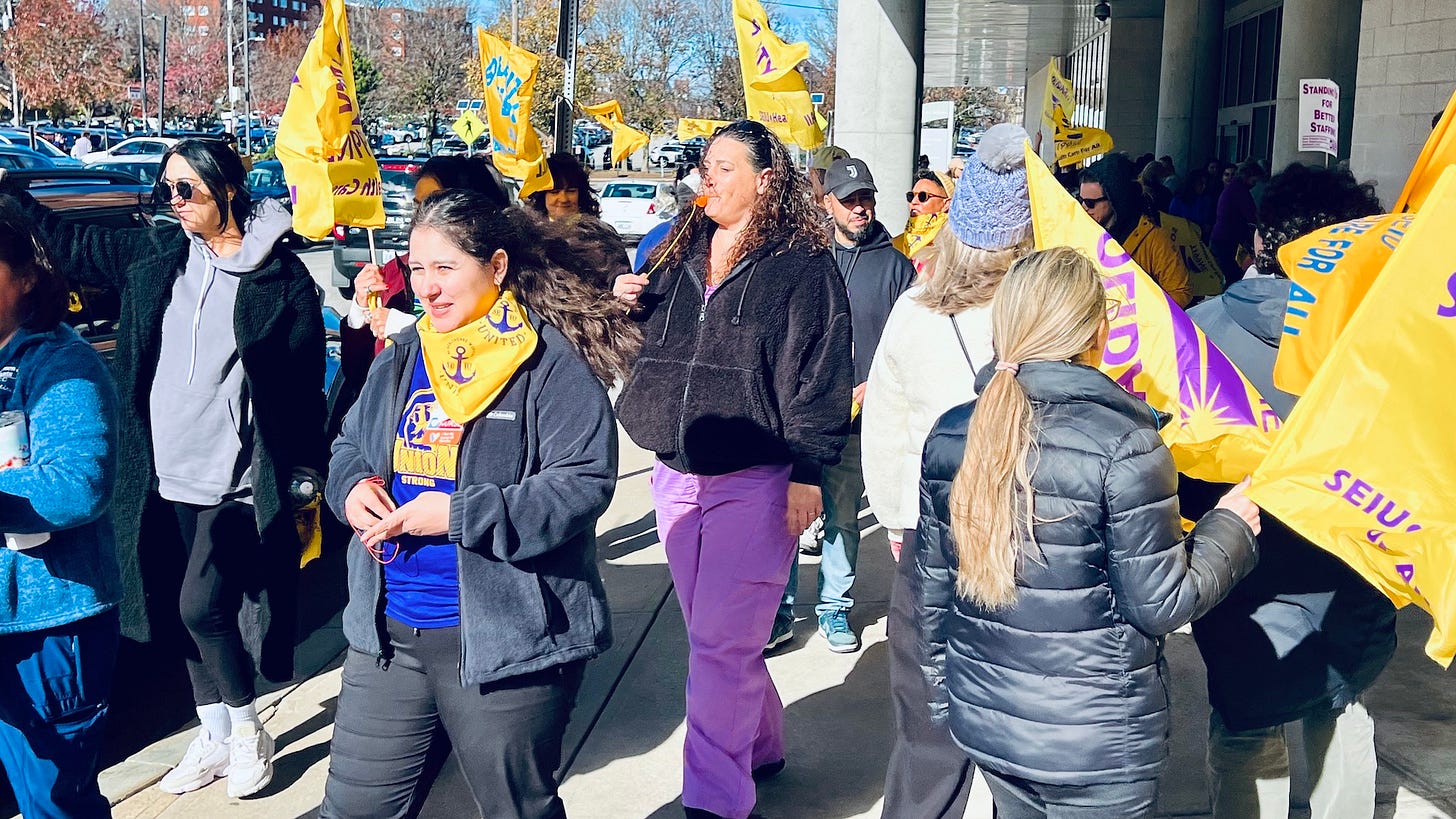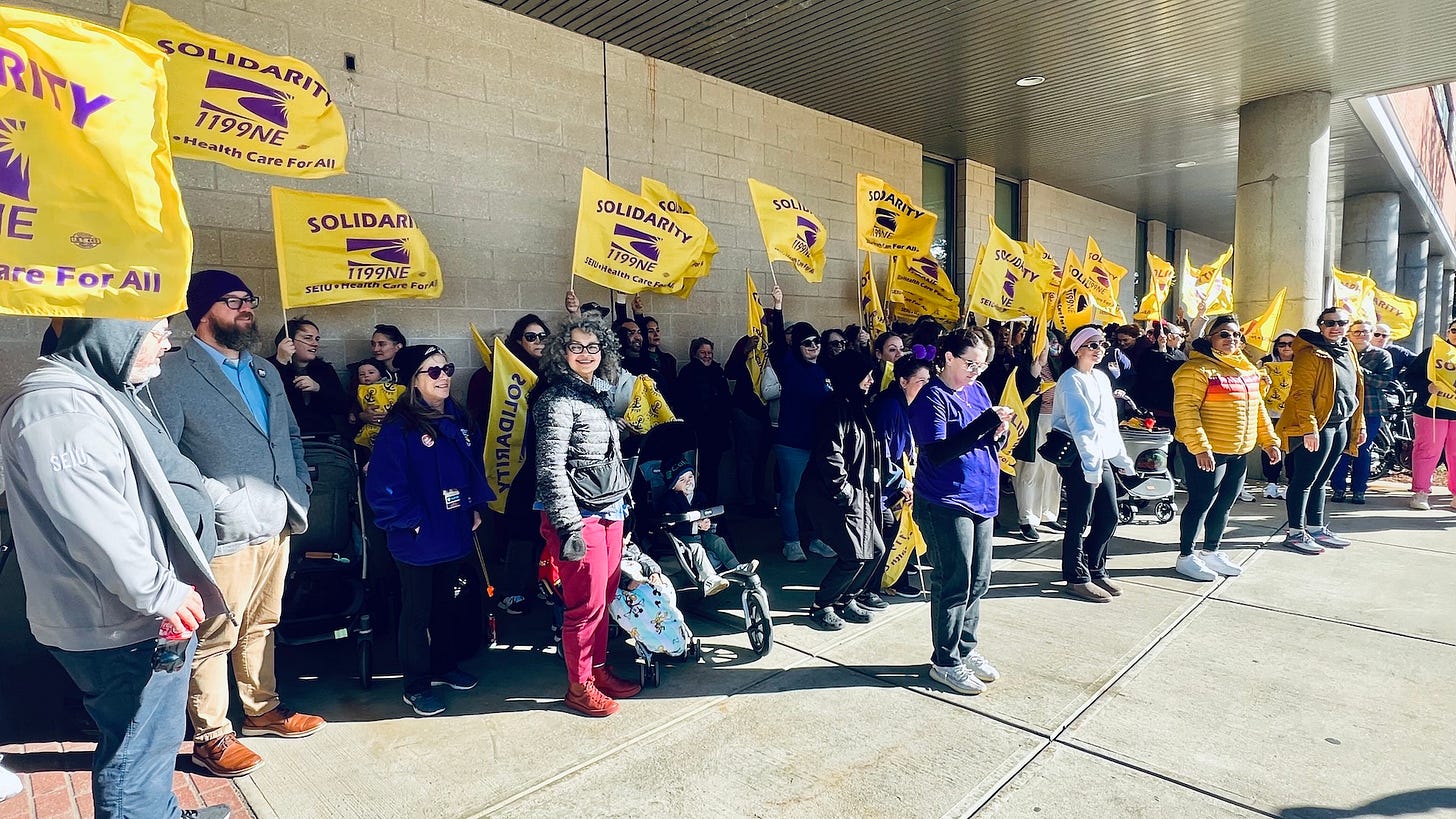Healthcare workers at Women & Infants picket to call attention to difficult negotiations
"We are working very short-staffed, critically most of the time, and management doesn’t seem to care."
Over 2,000 SEIU 1199 New England Women & Infants Hospital employees have been bargaining with their employer to settle a new contract since October. Earlier this month, nearly 1,500 frontline caregivers at the hospital, constituting 99.9% of workers who participated, voted yes to authorize an unfair labor practice informational picket.
In the last three bargaining sessions with the Union, Women & Infants’s management offered proposals that would erode job standards, trample union rights, and fail to solve the staffing crisis at the Hospital. Even more concerning, the Union has identified numerous categories of behavior by the Hospital that are both unlawful and unacceptable to the union members, including,
Refusal to bargain over several changes in the terms and conditions of employment of Union workers;
Refusing to provide the information requested to formulate bargaining proposals and respond to the Hospital’s proposals and;
Intimidating, threatening, and, in the most extreme cases – engaging in impermissive physical acts against union members and staff in retaliation for their testimony against the Hospital in a federal unfair labor practice trial before an Administrative Law Judge of the National Labor Relations Board. These clear and numerous violations of the National Labor Relations Act have prompted the Union to file multiple unfair labor practice charges against the Hospital.
As hundreds of union workers, joined by elected officials, marched and chanted, I spoke with Cheryl Frazier, who has been working at the hospital for three decades and is one of the union members negotiating with management.
Cheryl Frazier: I have been an RN at Women & Infants for 35 years, so I’ve spent my whole career here.
Steve Ahlquist: All three of my kids were born here.
Cheryl Frazier: I also have three children. They were all born here. My first daughter was born very premature and was in the NICU for over a hundred days. When I started here, I worked in the surgical oncology unit, and there was a real community feel. We had a lot of educational support, and I grew into the nurse I am today. I felt very comfortable in my work. I worked there for 13 years, then transitioned to the mother/baby unit, which is a little different. I went from the end to the beginning of life and helped families care for their babies, women, infants, and the family. It’s a very rewarding job, and I love what I do.
Steve Ahlquist: I’m happy for that.
Cheryl Frazier: Over the years, things have changed. I’ve been through many administrations. In the past, we always worked collaboratively, and we were proud of the decision-making and worked on policies. This administration has failed to have a relationship - and communicate with us. As a nonprofit hospital, we are here to serve the community. Our job as frontline care workers is to help patients reach their goals when they come into the hospital. To do that, we need the administration’s support and respect.
Our concerns were brushed aside. We have gone to negotiations. We’re sitting across from management, who are not allowed to speak to us. The only one who can tell is the lawyer. I have been through several negotiations. This is never the way it was.
They’re trying to take us back instead of lifting us up. People in this hospital have started in dietary to housekeeping and worked their way up through education and support. It’s a team sport. As a leader, you need to have people follow you, and in order to do that, they need to trust you and respect you—and that is not here. We are working very short-staffed, critically most of the time, and management doesn’t seem to care.
Steve Ahlquist: You’re negotiating a new contract. When does the old contract expire?
Cheryl Frazier: The contract expires at the end of this month. We have three or four more meetings with them, but every proposal they have put on the table is bringing us down. I don’t understand what their goal is. Our mission statement says we’re here to serve the community, not to make money. I feel that we, as the workers, are suffering; in turn, the community is suffering. Trying to take care of somebody as a frontline worker is very hard. We’ve had increased patient complaints and dissatisfaction, but that’s not what we want to hear.
Steve Ahlquist: When they put this kind of pressure on workers, they know that you will do everything you can to ensure that patients are okay. They don’t have to deal with that if you go above and beyond. So they can cut staffing knowing that you will do more and more because you have an obligation to the patients that you feel viscerally—a one-on-one connection.
Cheryl Frazier: This is our community. I used to be so proud to say that I worked in this hospital, and neighbors and friends would say, “You took care of me when I had my child.”
Now I’m a little bit iffy about telling people I work here. I get a lot of people who have had bad experiences. It is terrible. Sometimes, that’s out of our control and it’s very hard. It’s not fulfilling. Sometimes, people come to work with a pit in their stomach about what will happen.
Steve Ahlquist: Work should never be a grind, especially when doing this kind of good work.
Cheryl Frazier: The past administration would come up to the units and talk with people to find out what’s happening. This administration is so in the dark about the reality in the building that it’s scary.
It shows that they don’t care about us or the community.
Steve Ahlquist: These negotiations are difficult because they’re not listening. They’re not talking to you?
Cheryl Frazier: No. Every time they pass a proposal, whether it be wages, healthcare, or working conditions, it’s all “cut, cut, cut.” We have cell phones, or ASCOM, as they call them, that we use to communicate in the hospital with doctors. We're supposed to have one for every nurse. We have maybe three on a ten-person unit.
Steve Ahlquist: Only 30% of the nurses are equipped with a way to communicate with a doctor?
Cheryl Frazier: But they’re spending money to buy GPS trackers, supposedly for our safety, to find out where we are in the building and how much time we spend.
Steve Ahlquist: If they wanted to, they could do that with a phone.
Cheryl Frazier: So I don’t think they are spending wisely.
Steve Ahlquist: What does the timeline look like going forward?
Cheryl Frazier: We have four more meetings, and we’re meeting four more times, and we haven't gotten into the back-and-forth yet. There’s been no communication at the table.
Steve Ahlquist: What does a strike look like? It would devastate the Rhode Island healthcare industry to have that.
Cheryl Frazier: There are over 2000 hospital employees in the union - from dietary to housekeeping to nurses. I don’t know how they’ll run this hospital without us. I know it will be most difficult for the community because access to care will change, and it will cost the hospital money.
Steve Ahlquist: What’s your message for the hospital administration?
Cheryl Frazier: Come to the table, be adults, and communicate. Any relationship is hard. It needs work, and we don’t feel they’re putting in the work.
Steve Ahlquist: I appreciate this a lot. Thank you very much.







